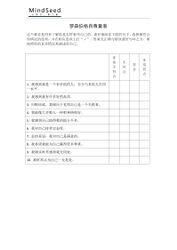本站将于近期进行系统升级及测试,您目前浏览的网站为旧版备份,因此可能会有部分显示和功能错误,为此带来的不便深表歉意。
罗森伯格自尊量表
| 罗森伯格自尊量表 | |
|---|---|
| 测量目标 | 测量个体的自尊程度 |
| 适用人群 | 普通人 |
| 问卷类型 | 自评 |
| 题数 | 10 |
| 计分 | 李克特4点 |
自尊量表(self-esteem scale,简称 SES)由Rosenberg于1965年编制,最初用以评定青少年关于自我价值和自我接纳的总体感受[1]。
内容简介
SES为自评量表,共10题,其中5个正向题和5个反向题,采用4点计分,1表示“完全不符合”,4表示“完全符合”,得分越高说明自尊程度越高。
量表英文版
问卷
Below is a list of statements dealing with your general feelings about yourself. Please indicate how strongly you agree or disagree with each statement.
1. On the whole, I am satisfied with myself.
2. At times I think I am no good at all.
3. I feel that I have a number of good qualities.
4. I am able to do things as well as most other people.
5. I feel I do not have much to be proud of.
6. I certainly feel useless at times.
7. I feel that I'm a person of worth, at least on an equal plane with others.
8. I wish I could have more respect for myself.
9. All in all, I am inclined to feel that I am a failure.
10. I take a positive attitude toward myself.
计分方式
Items 2, 5, 6, 8, 9 are reverse scored. Give "Strongly Disagree" 1 point, "Disagree" 2 points, "Agree" 3 points, and "Strongly Agree" 4 points. Sum scores for all ten items. Keep scores on a continuous scale. Higher scores indicate higher self-esteem.
量表中文版

1. 我感到我是一个有价值的人,至少与其他人在同一水平。
2. 我感到我有许多好的品质。
3. 归根结底,我倾向于觉得自己是一个失败者。
4. 我能像大多数人一样把事情做好。
5. 我感到自己值得豪的地方不多。
6. 我对自己持肯定态度。
7. 总的来说,我对自己是满意的。
8. 我希望我能为自己赢得更多尊重。
9. 我确实时常感到毫无用处。
10. 我时常认为自己一无是处。
- ^ Rosenberg, M. (1965). Society and the adolescent self-image. Princeton, NJ: Princeton University Press.
